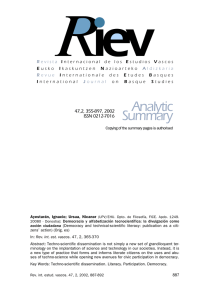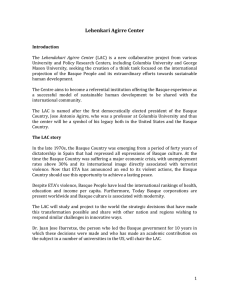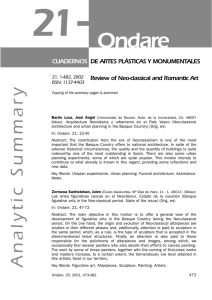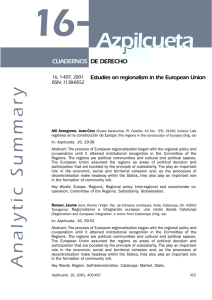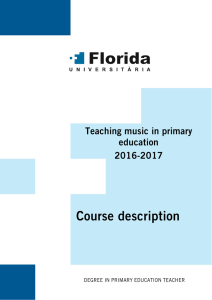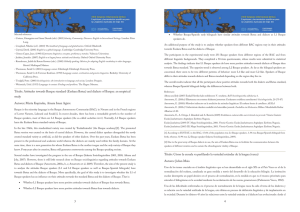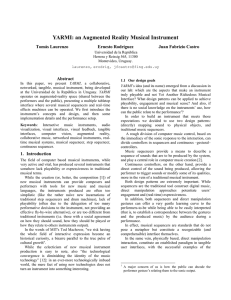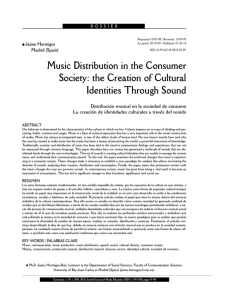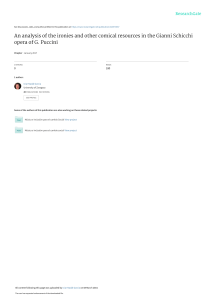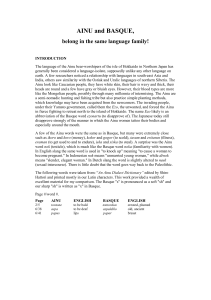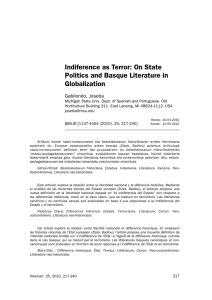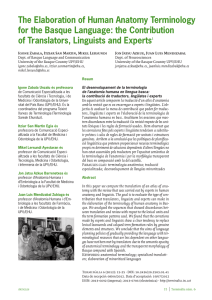Analytic Summary Música
Anuncio
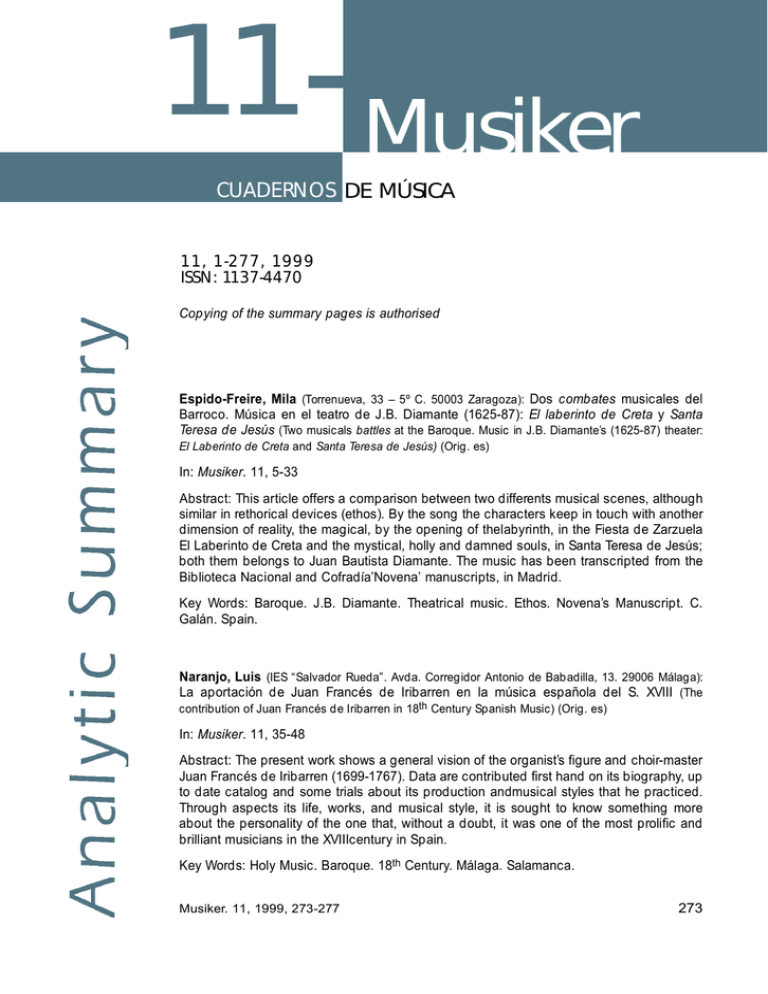
11 Musiker CUADERNOS DE MÚSICA 11, 1-277, 1999 ISSN: 1137-4470 Comunidades pesqueras Copying of the summary pages is authorised Espido-Freire, Mila (Torrenueva, 33 – 5º C. 50003 Zaragoza): Dos combates musicales del Barroco. Música en el teatro de J.B. Diamante (1625-87): El laberinto de Creta y Santa Teresa de Jesús (Two musicals battles at the Baroque. Music in J.B. Diamante’s (1625-87) theater: El Laberinto de Creta and Santa Teresa de Jesús) (Orig. es) In: Musiker. 11, 5-33 Abstract: This article offers a comparison between two differents musical scenes, although similar in rethorical devices (ethos). By the song the characters keep in touch with another dimension of reality, the magical, by the opening of thelabyrinth, in the Fiesta de Zarzuela El Laberinto de Creta and the mystical, holly and damned souls, in Santa Teresa de Jesús; both them belongs to Juan Bautista Diamante. The music has been transcripted from the Biblioteca Nacional and Cofradía’Novena’ manuscripts, in Madrid. Key Words: Baroque. J.B. Diamante. Theatrical music. Ethos. Novena’s Manuscript. C. Galán. Spain. Naranjo, Luis (IES “Salvador Rueda”. Avda. Corregidor Antonio de Babadilla, 13. 29006 Málaga): La aportación de Juan Francés de Iribarren en la música española del S. XVIII (The contribution of Juan Francés de Iribarren in 18th Century Spanish Music) (Orig. es) In: Musiker. 11, 35-48 Abstract: The present work shows a general vision of the organist’s figure and choir-master Juan Francés de Iribarren (1699-1767). Data are contributed first hand on its biography, up to date catalog and some trials about its production andmusical styles that he practiced. Through aspects its life, works, and musical style, it is sought to know something more about the personality of the one that, without a doubt, it was one of the most prolific and brilliant musicians in the XVIIIcentury in Spain. Key Words: Holy Music. Baroque. 18th Century. Málaga. Salamanca. Musiker. 11, 1999, 273-277 273 Ibarretxe, Gotzon (Univ. Pública de Navarra. Dpto. Psicología y Pedagogía. Campus Arrosadía. 31006 Iruñea): Carmelo A. Bernaola: de la fenomenología sonora al significado textual (Carmelo A. Bernaola: from sound phenomenology to textual meaning) (Orig. es) In: Musiker. 11, 49-63 Abstract: The aesthetics of the “craftsperson poetics” somehow defines an eclectic and excellent composer like Carmelo A. Bernaola, who works in a wide range of genders and musical styles. However, the peculiarities of the composer are not enough to satisfy the many senses and concrete contents that his works express, and which are only recognisable by means of a study of their textual meaning. Key Words: Ethnomusicology. Contemporary Music. Basque Music. Carmelo A. Bernaola. Lazkano Ortega, Ramón (131, rue Clignancourt. F-75018 Paris): Préliminaires pour une étude de la polyrythmie (Preliminaries to a study of polyrythmics) (Orig. fr) In: Musiker. 11, 65-84 Abstract: The growing use of polyrythmic techniques in twentieth century music makes us think of a possible systematic basis for analysis and understanding of time phenomena inherent to the musical work, as well as of the interaction betweendivergent time expressions within the same work. Key Words: Time. Music. Rhythm. Pulsation. Tempo. Meter. Larrañaga, Patxi J. (Instituto Cervantes. Via di Villa Albani, 16. 00198 Roma): Espacios para la música (Spaces for music) (Orig. es) In: Musiker. 11, 85-96 Abstract: Contemporary music is in danger of death. Not because it does not have its specific weight in the general market of consumer products – this is necessarily so-, but because it is unknown by the public, which moves with a certain knowledge in other disciplines. The reasons of this isolation are not the ones that we generally listen to, but others which are much more strategic. If we want to come out of such a situation, then ethical, aesthetic and strategic innovations will be necessary. Among the latter, since continuing to look for a place for contemporary music around classical music does not lead to anything, it is necessary to locate that place in the dissemination nodules of the rest of the arts. Key Words: Creative music. Composer. Audience. Ethics. Statics. 274 Musiker. 11, 1999, 273-277 Jones, Daniel E. (Univ. Ramon Llull. Fac. de Ciències de la Comunicació Blanquerna. Valdonzella, 23. 08001 Barcelona): El despliegue transnacional de la industria fonográfica: los casos de América Latina, España y el País Vasco (The trans-national deployment of phonographic industry: the cases of Latin America, Spain and the Basque Country) (Orig. es) In: Musiker. 11, 97-115 Abstract: This article introduces a panoramic view on the trans-national deployment of the phonographic industry in three different territorial zones, which are very related with one another. The first is a peripheral macro region within the world capitalist system ( Latin America), the second is a peripheral State (Spain) within one of the most developed areas in the planet (the European Union) and a developed micro region (the Basque Country) within this same State. Considerable imbalances can thus be verified both in the world level and in the macro or micro regions. Key Words: Phonographic industry. Latin America. Spain. Basque Country. Laucirica Larrinaga, Ana (Univ. Pública de Navarra. Dpto. de Psicología y Pedagogía. Area de Didáctica de la Expresión Musical. Campus Arrosadía s/n. 31006 Iruñea): Efectos del oído absoluto en la práctica musical (Effects of absolute pitch in the musical behavior) (Orig. es) In: Musiker. 11, 117-130 Abstract: Over the last few years new lines of research have been initiated in order to study if an absolute capacity of hearing is actually advantageous in musical practice. Frequent contradictory results have led us to reflect on the different types of absolute hearing and to observe data that cannot be monitored by psicoacustics on the musical life of the subject evaluated. We could thus contribute to an improvement of the educational evaluation and to a new position on development proposals of melodic skills. Key Words: Absolute ear. Melodic perception. Psychology of music. Musical education. Jimeno Gracia, María Manuela (Univ. Pública de Navarra. Dpto. Psicología y Pedagogía. Campus de Arrosadía s/n. 31006 Iruñea): La Investigación - Acción en el Contexto de la Educación Musical (Action – Research in the Context of Music Education) (Orig. es) In: Musiker. 11, 131-147 Abstract: This is a work of research that proposes a framework to adapt, organise, arrange, and interrelate the “Curriucula” in both Music Schools (ages 3-12) an Music Education in Teacher Training programmes for Early Years and Primary levels(ages 3-12). The aim being to analyse converging and diverging points, from the dual Art and Science perspective in Music. A team of primary and pre-school teachers as well as teachers from Music Schools, all conducted by Mª Manuela Jimeno, areactively taking part in the scheme. The research proposal is currently being developed in several schools in the Community of Navarre under the sponsorship of the Department of Education and Culture of the Government of Navarre. Since 1995, thePublic University of Navarre has laid the rationale and has studied the proposals. Key Words: Music. Early Years-Primary levels. Adapt. Attitude. Aptitude. Science. Art. Musiker. 11, 1999, 273-277 275 Sánchez Equiza, Carlos (Nagusi Kalea, 57, 4. D. 31001 Iruñea): Juan Ignacio de Iztueta: euskal dantzen erreforma ilustratua (Juan Ignacio de Iztueta: The Enlightened Reform of the Basque dances) (Orig. eu) In: Musiker. 11, 149-158 Abstract: The author proposes a new interpretation about Juan Ignacio de Iztueta, based on the historical context of his work. In his opinion, this work is not a compilation of traditions made in Basque apologistic terms, as Iztueta said, but atrue reform made by some enlightened people. This reform, not only aesthetic, but social and political too, consisted essentially of a mixture between that time’s Basque traditional and the European erudite one. Key Words: Iztueta. Basque dance. Enlightenment. Basque apology. Levman, B.G.; Lopez de Luzuriaga, Iñaki (Itzul.) (Eusko Ikaskuntza. Miramar Jauregia Miraconcha, 48. 20007 Donostia): Musika eta Mintzairaren Sorrera (The origin of language and music) (Orig. eu) In: Musiker. 11, 159-182 Abstract: In the present article the author makes reference to the evolutionary relationship between music and language and to the nature of both skills, exposing different theories in the past and present in connection with this issue. The author maintains, together with B.G. Levman, that both language and music were born out of the same primitive capacity and considers that language is, fundamentally, music. He also reports on the pros and cons of the hypothesis he advances. In this sense, he describes the conduct of various peoples and races and of various animals, constructing a particularly complete treatment of the topic with analysis carried out from various disciplines: ethnomusicology, ethology, anthropology and psychology. Key Words: Primitive language. Double articulation. Melodic tone. Orthoepy. Appropriation of language. Rhythm. Evolution. Survival. Phonology. Acoustics. Symbolic communication. Identity. Beltran Argiñena, Juan Mari (Herri Musikaren Txokoa. Ergoien. 20180 Oiartzun): Herri musikaren dokumentazio zentru bat egiteko, antolatzeko eta funtzionamendurako egitasmoa (Program for the creation, organisation and operation of a documentation centre for popular music) (Orig. eu) In: Musiker. 11, 183-201 Abstract: The author has been proposing, as from 1995, the creation of a “Herri Musikaren Txokoa” with the purpose of disseminating and spreading traditional music. In the former Ergoien School at Oiartzun, a data base is being elaborated and organised as well as an exhibition of more than 800 instruments possessed by the school, and a specialised library, record library, picture archives and a workshop. This article introduces the project of this centre of documentation. Key Words: Herri Musikaren Txokoa. Traditional music. Musical instrument. Documentation Center. Classification. 276 Musiker. 11, 1999, 273-277 Ansorena, José Luis; Bagüés, Jon (ERESBIL - Archivo de Compositores Vascos. Martin Etxeberria, 15. 20100 Errenteria): Cartas a ERESBIL (Letters to ERESBIL) (Orig. es) In: Musiker. 11, 203-272 Abstract: The celebration of 25th anniversary of the creation of ERESBIL – the Basque Composers Archive, allows for a review of 25 years of epistolary relationships that encompass a wide range of topics and names for the research on the musical history of the Basque Country. A selection has been made of the correspondence received in Eresbil and which in one way or another is a summary on the people that have contributed to clarify quite a few queries on pieces of music and on musicians themselves. The letters selected have been sorted out by putting first those received from 67 living composers and their relatives; followed by correspondence that refers to musical documentation; correspondence with archivists, with musicologists, with critics, with other researchers, with performers, and followed finally by correspondence of a varied nature. Key Words: Correspondence. Epistolary. Music. Musicians. Musiker. 11, 1999, 273-277 277
